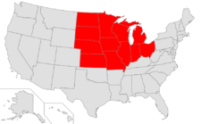Two more midwestern states passed laws last month requiring newspapers to post notices on their press association’s statewide public notice website. With Minnesota and Michigan joining South Dakota and Nebraska, four states in the region have now passed web-posting laws this year.
In total, eighteen states now have web-posting statutes on the books.
The new law in Minnesota requires newspapers to publish their notices on the Minnesota Newspaper Association’s statewide public notice website and to include an index link to the public notice section on their own websites. (Current law in Minnesota already requires newspapers to post notices on their website; the new law adds the index-link requirement and forbids the notices from being posted behind a paywall.)
HF-3682 also liberalizes public notice eligibility standards by authorizing e-editions of a newspaper to meet publication-frequency mandates, although all notices in Minnesota still must be published in print. It also expands eligibility by eliminating specific circulation minimums. Rather than a fixed circulation total, the new law merely requires “more than a nominal percentage” of total print circulation to be circulated in the publication area. That new standard will be met if “there is a reasonable likelihood that the person to whom it is directed will become aware of the notice.”
The bill passed the Senate unanimously and was approved in the House by a margin of 104-22. It was signed by Gov. Tim Walz on May 19 and takes effect on August 1.
Michigan’s SB-258, introduced in 2021, requires newspapers to publish notices on their own websites and on the Michigan Press Association (MPA) statewide public notice site. It also adopts standards for the duration, placement, accessibility and searchability of the notices, and requires the statewide site to provide a method allowing the public to receive notices via text and email.
SB-258 includes two novel provisions that establish standards for archivability, verification and third-party independence — elements characteristic of a valid notice. It requires newspapers to maintain “a permanent and complete printed copy of each published edition that contains the notice for archival and verification purposes.” And it forbids newspapers “controlled by the person on whose behalf the notice is published” to qualify to publish notices.
Like Minnesota’s bill, Michigan SB-258 passed the Senate unanimously but had some naysayers in the House, where it was approved by a vote of 61-38. It was signed by Gov. Gretchen Whitmer on May 12 and took immediate effect.
As publishers in Florida recently learned, the legislative process never ends and quick policy reversals can’t be discounted. So publishers in Michigan shouldn’t have been too surprised when a week after the governor signed SB-258 a hearing was held in the House Oversight Committee on a different bill that would undermine the new law. That bill, HB-6062, would allow government entities to post notices on their websites in lieu of local newspapers.
The new bill was introduced by Rep. Kevin Coleman, D-Westland. It was co-sponsored by Rep. Steven Johnson, R-Wayland, who chairs the committee that convened the May 19 hearing (discussion about HB-6062 begins at 09:30) on the bill. Rep. Johnson introduced a piece of legislation about a month before the end of the 2019-20 session that would have completely eliminated newspaper notice in the state.
HB-6062 is scheduled for another hearing in the Oversight Committee this Thursday.

